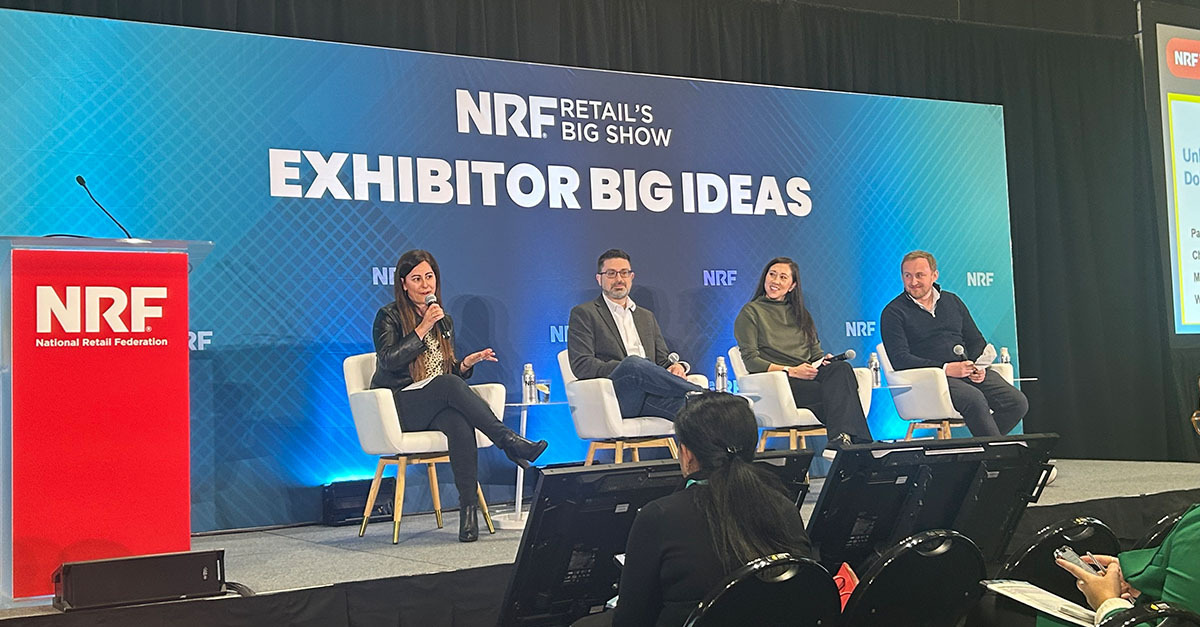Gen Z, AI, and Personalization Trending In 2024
January 25, 2024
Recapping the key themes and takeaways from the NRF 2024: Retail’s Big Show in New York City.

January 25, 2024
Recapping the key themes and takeaways from the NRF 2024: Retail’s Big Show in New York City.

In an era defined by rapidly evolving consumer preferences and technological advancements, NRF 2024 lived up to its billing and featured some of the industry’s most notable leaders delving into the forward-leaning topics and innovations shaping the future of retail.
Below, the MERGE team shares insights from sessions that explored everything from the nuances of engaging Gen Z, to the integration of artificial intelligence in retail, as well as one company’s compelling journey towards achieving personalization at scale.
Decoding Gen Z
At NRF 2024, several industry leaders discussed the importance of truly getting to know Gen Z. As Caleb Pearson, VP of U.S. Customer Engagement at McDonald's noted, engaging Gen Z requires a culture of learning from failures, and brands must be prepared to listen and move quickly to embrace social trends and movements authentically. According to Pearson, “sharing the pen” with Gen Z and providing an avenue for self-expression is critical. During this session, leading brands such as Spotify and H&M – alongside McDonald’s – shared their insights on fostering loyalty and engaging Gen Z customers through channels like TikTok.
When it comes to defining Gen Z, Ann Piper, Head of North American Ad Sales at Spotify countered the perception of Gen Z as entitled, emphasizing their concern for financial well-being and work ethic. Pearson underscored this sentiment from his panel colleague, projecting that by 2030, he expects that more than half of QSRs will be owned by this cohort. Meanwhile, Linda Li, Head of Customer Activation and Marketing at H&M Americas challenged the notion that Gen Z is fully digital, pointing out their preference for in-store experiences that cater to personalization and self-expression. In turn, H&M has placed greater focus on integrating digital and in-person experiences for this emerging audience.
Establishing loyalty with Gen Z consumers was also top of mind for the panelists. For H&M, the belief is that loyalty programs must be both transactional and non-transactional in order to create authentic long-lasting bonds with Gen Z-ers, in addition to leveraging data that provide personalized offers and exclusive experiences. Meanwhile, for Spotify, fostering loyalty involves connecting listeners with their favorite artists. To do this, one approach has been to offer merchandise exclusively available on Spotify to enhance the fan-artist relationship.
Reinventing Retail for the AI Generation
Retailers are entering a new phase of technological innovation – with artificial intelligence (AI) and machine learning at its core. AI has emerged as the most effective way for retailers to turn data into value. Walmart, in particular, is using AI to drive growth and competitive advantage across the business.
Anshu Bhardwaj, Senior VP and COO at Walmart Global Technology and Walmart Commerce Technologies, outlined Walmart's focus areas, including tech strategy and operations, tech modernization, and commerce technologies. With the goal of creating an open ecosystem (SaaS) between AI and Commerce, Walmart aims to transition from an omnichannel retailer to an adaptive retailer. The expectation is that AI will play a crucial role in enhancing customer experience, boosting revenue, and managing inventory, with an emphasis on prioritizing customer delight over pain points.
Additionally, AI's impact on the workforce was discussed, envisioning a people-led, tech-powered omnichannel organization where technology eliminates difficult tasks and enhances job satisfaction. Examples of AI implementation include facilitating "buy online and pick up in-store" operations and personalizing recommendations using AI for out-of-stock items. Walmart's "Me at Campus," a smart assistant leveraging AI, helps employees perform their tasks more efficiently. The session concluded that shoppers are receptive to AI if it improves their shopping experience, as exemplified by the "Text to Shop" feature, which allows access to Walmart's full product catalog.
The Push for Personalization At Scale
The growing push for personalization at scale in retail is driven by the quest to enhance customer engagement and loyalty. Brands that tailor their product offerings, services, and communication to individual customer preferences, stand to significantly improve customer satisfaction. Additionally, retailers stand to not only drive repeat purchases, but build customer advocacy, both of which contribute to sustainable revenue growth.
At NRF 2024, Dollar General – America's fastest-growing retailer by store count – unveiled their comprehensive digital engagement strategy aimed at boosting revenues and ad spend efficiency. The company is developing a sophisticated customer data platform and marketing stack to deliver personalized omnichannel experiences at scale, fostering a connection between digital and in-store marketing to engage their predominantly in-person clientele in markets of 20,000 or less. Leveraging over two billion transactions, Dollar General aims to understand consumer preferences and achieve unmatched reach in the mostly rural markets they operate in, while maintaining a consistent experience across channels. Through a holistic operating model that prioritizes clean data and uses the Adobe Tech stack for efficient data management and analytics, coupled with a commitment to experimentation via a multivariate approach, Dollar General looks to balance scale and personalization in its journey to optimize efficiencies and gain a comprehensive understanding of their customers.
The Wrap
NRF: Retail’s Big Show once again delivered as a premier event on the retail industry calendar this year, allowing retailers and marketers from all corners of the world to come together to network, learn, and discuss the most relevant trends taking place in the industry. From decoding Gen Z preferences to revisiting and reinforcing the notion of retail with AI, and the pursuit of personalization at scale, the insights shared at NRF helped reveal a transformative path forward for retail brands across the board.
Looking to keep your brand’s marketing efforts on the cutting edge? Connect with MERGE's retail experts to help future-proof your efforts today!